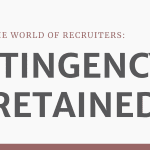Exploring the Impact of Pay Transparency and Quiet Hiring in the Job Market
The New Era of the Job Market
As we settle into the new year and consider the opportunities ahead of us, here are a couple of current trends in the job market that many are discussing.
Jess, a senior project manager looking for a new role for quite some time, is in the final interview stage with a couple of companies. She needs an idea of the compensation to make an informed decision about the two organizations she is considering. She believes she has the experience and skills to meet their needs but doesn’t want to waste time if the opportunities don’t meet her needs.
PAY TRANSPARENCY
Pay transparency has become one the most widespread post-pandemic and Great Resignation phrases and job market trends in the professional world. Transparency removes some guesswork in the job search and streamlines building a more invested and reliable team. States that require salary disclosure in job ads include Washington, California, Colorado, and New York. Many more may soon follow suit, which will have an impact on the labor market.
According to a Pew Research Center survey, low wages accounted for 63% of the people who quit during the Great Resignation. As some organizations become more transparent about salaries, this may cause others to reevaluate their pay structures and simultaneously cultivate a culture of overall openness. For those top candidates considering new opportunities, wage transparency eliminates some guesswork and fosters confidence and trust, which can ultimately lead to productivity and retention.
It can benefit current employees by reducing inequities amongst employees within categories of gender, age, and race. According to Payscale, women earn 97 cents for every dollar their male colleagues earn with the same experience and skill level.
Whether in a leadership capacity that allows you to affect immediate change or an employee contemplating your next move, this information can help you assess where your organization lands.
QUIET HIRING – Essential Job Market Trend
Nathan has been frustrated for a while. He understands the value he brings to his current company, but feels as though leadership takes him for granted. Nathan dreads going to work and has decided to get his resume and career marketing documents in order. He can either use those documents to seek a promotion or use them to find a job with another company.
Quiet quitting is a phrase that has been heard lately and is a trend where employees mentally quit, refuse to go above and beyond, and do the minimum required to keep their jobs. This job market trend is both a loss for the employee and the employer. As organizations reflect on this job market trend, some respond with “quiet hiring” to acquire new skills and capabilities without adding new full-time employees. As leaders, take advantage of this opportunity to strategize the growth of your team members and discuss career-advancement goals. For employees, it’s a tremendous opportunity for those interested in upskilling and securing a promotion from within your organization.





